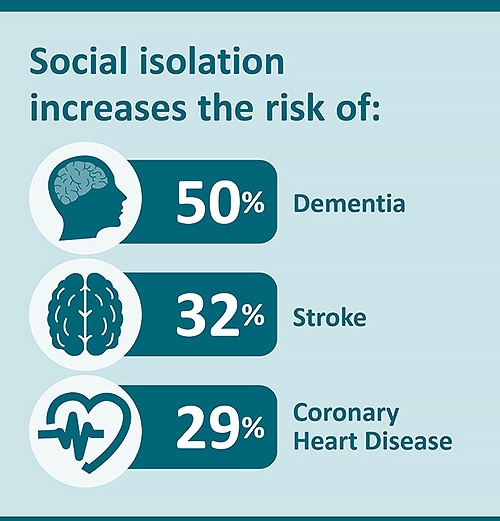The Power of Connection: How It Can Improve Our Health
Loneliness and social isolation are widespread problems in the United States.
- Surveys suggest that 1 in 3 US adults aged 45 and older feel lonely.1
- Even though technology connects us now more than ever, it can also disconnect us from the people around us, leading to feelings of loneliness.
Loneliness and social isolation can do more harm to our health than we realize. They can increase the risk of heart disease, depression, and cognitive decline (worsening memory loss).2-8
Anyone can feel lonely, but some people may have a harder time connecting with others, including those with poor physical or mental health or financial insecurity; those who live alone, identify as LGTBQ+, or immigrated to the United States; and younger and aging populations.
The good news is that you can take steps to ease social isolation and loneliness and improve your health and well-being.
What is social connectedness and why is it important?
When you feel like you belong and have the support and care you need, as well as the number, quality, and diversity of relationships you want—this is what’s known as social connectedness. People with meaningful social connections have:
- Less stress and better sleep.
- Better overall health that can lead to a longer life.
- Healthier habits and behaviors.
- Better quality of life and a sense of belonging.
How you can create and strengthen social connections
No matter who you are or if your relationships were affected by the COVID-19 pandemic, you can take steps to create new and stronger relationships.
Improving social connections can take time. There are no official guidelines or a one-size-fits-all strategy, but these tips can help:
- Invest time in nurturing your relationships.
- Explore ways to meet new people, like joining a club or taking a class.
- Share things you already do (like exercising or having a meal) with a friend—or do new activities with them.
- Find ways to be responsive, supportive, and grateful to others.
- Reduce practices that lead to feelings of disconnection from others, such as excessive social media use.
- Talk to a health care provider if you are concerned about stress, loneliness, and social isolation to ensure you are taking care of your mental health.


Source: 1
- Model and encourage healthy relationships.
- Plan activities to help your child make friends who are different from them.
- Encourage them to develop strong, safe, and stable relationships with supportive adults, like family members, friends, neighbors, and teachers.
- Talk with them about negative influences or stresses, like peer pressure and feelings of rejection or not belonging, which can increase their risk of social isolation and loneliness.
- Talk to your child’s doctor if you’re concerned that they feel lonely and lack meaningful relationships, or if there have been changes in their social connections.